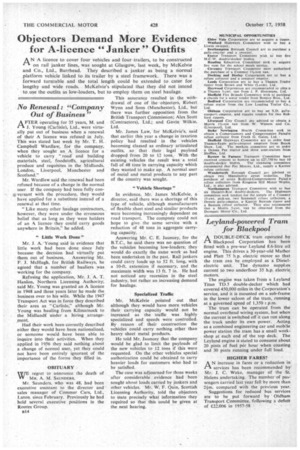Objectors Demand More Evidence for A licence 6 6 Janker "Outfits
Page 48

If you've noticed an error in this article please click here to report it so we can fix it.
A N A licence to cover four vehicles and four trailers, to be constructed
on rail janker lines, was sought at Glasgow, last week, by McKelvie and Co., Ltd., Barrhead. They described a janker as being a normal platform vehicle linked to its trailer by a steel framework. There was a forward turntable and the total length could be extended to cater for lengthy and wide roads. McKelvie's stipulated that they did not intend to,use the outfits as low-loaders, but to employ them on steel haulage.
No Renewal : "Company Out of Business"
AFTER Operating for 35 years, M. and J. Young (Carlisle), Ltd., were virtually put out of business when a renewal of their A licence was refused in July. This was stated last week by Mr. T. H. Campbell Wardlaw, for the company, when they sought an A licence for a vehicle to carry "road and building materials, steel, foodstuffs, agricultural produce and requisites in the Midlands. London, Liverpool, Manchester and Scotland."
Mr. Wardlaw said the renewal had been refused because of a change in the normal user If the company had been fully con4 versant with the procedure. they would have applied for a substitute instead of a renewal at that time.
"Like many other haulage contractors, however, they were under the erroneous belief that as long as they were holders of an ot licence they could carry goods anywhere in Britain," he added.
" Little Work Done"
Mr. J. A. Young said in evidence that little work had been done since July because the decision had virtually put
them out of business. Answering Mr. F. J. McHugh, for British Railways, he agreed that a number of hauliers was working for the company.
Refusing the application, Mr. J. A. T. Hanlon, Northern Licensing Authority, said Mr. Young was granted an A licence in 1948 and three years later he made the business over to his wife. While the 1947' Transport Act was in force they described their area as "Carlisle," although Mr. Young was hauling from Kilmarnock to the Midlands under a hiring arrangement.
Had their work been correctly described either they would have been nationalized, or someone would have been able to inquire into their activities. When they applied in 1956 they said nothing about a change of normal user, yet they could not have been entirely ignorant of the importance of the forms they filled in.
OBITUARY
WE regret to announce the death of MR. A. M. SAUNDERS. Mr. Saunders, who was 48, had been executive assistant to the director and sales manager of Commer Cars, Ltd., Luton, since February. Previously he had held several executive positions in the Rootes Group.
B14 This assurance resulted in the withdrawal of one of the objectors, Robert Wynn and Sons (Manchester), Ltd., but there was further opposition from the British Transport Commission; Alex Scott (Contractors), Ltd.; and Gavin Wilkie, Ltd.
Mr. James Law, for McKelvies, said that earlier this year a change in taxation policy had resulted in the vehicles becoming classed as ordinary articulated outfits, so that their legal payload dropped from 20 to 12 tons. With the existing vehicles the result Was a total fall of 48 tons in carrying capacity which they wanted to make up. A normal user of metal and metal products to any part of the country was sought.
"Vehicle Shortage"
In evidence, Mr. James McKelvie, a director, said there was a shortage of this type .of vehicle, although manufacturers of flexible sheet steel and similar products were becoming increasingly dependent on road transport. The company could not hope to give, the same service with a reduction of 48 tons in aggregate carry
ing capacity.
Answering Mr. C. E. Jauncey, for the B.T.C., he said there was no question of the vehicles becoming low-loaders; they would do exactly the same work as had been undertaken in the past. Rail jankers could carry loads up to 52 ft. long, with a 10-ft. extension if necessary, and the maximum width was 13 ft. 7 in. He had not noticed any recession in the steel industry, but rather an increasing demand for haulage.
Specialized Traffic
Mr. McKelvie pointed out that although they would have more vehicles their carrying capacity would not be increased as the traffic was highly specialized and speeds were controlled. By reason of their construction the vehicles could carry nothing other than heavy sheet metal products.
He told Mr. Jauncey that the company would be glad to limit the payloads of the new vehicles to 12 tons if this were requested. On the other vehicles special authorization could be obtained to carry heavier loads for customers who had to be satisfied.
The case was adjourned for three weeks after considerable evidence had been sought about loads carried by jankers and other vehicles. Mr, W. F. Quin, Scottish Licensing Authority, told the objectors to state precisely what information they required so that this could be given at the next hearing.




















































































































